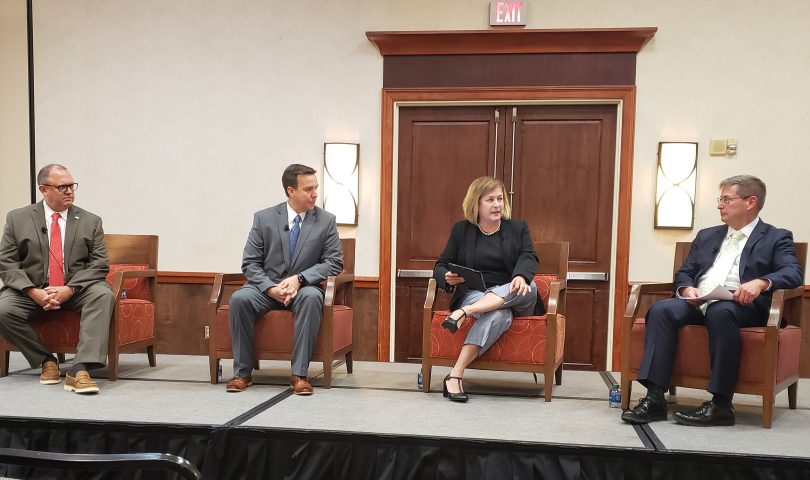MORGANTOWN – One message everyone at WVU’s Evolving Energy Conference agreed on Thursday morning was that the energy transition is a tag team effort. Industry makes the actual advances. But government plays a role in terms of regulations, cash and other incentives.
Andrew Robinson, director of Economic Development for Sen. Joe Manchin, said West Virginia is particularly well positioned because it has two senators, from both sides of the aisle, who constantly work together and are well placed in the Senate.

Manchin chairs Energy, Robinson said. Sen. Shelley Moore Capito is ranking member of Environment and Public Works. And, unique among the states, both are on Appropriations. Federal funds from the bipartisan Infrastructure Investment and Jobs Act and from the Inflation Reduction Act will help move West Virginia forward in the transition while helping to revitalize hard-hit coal communities with new industrial and job opportunities.
Jacqueline Fidler, vice president for Environmental and Sustainability at CONSOL Energy, talked about several key roles government can and should play. One is offering efficient, streamlined permitting (it wasn’t mentioned at the conference that Manchin’s bill to do just that, the Energy Independence and Security Act, died in the Senate with opposition from both parties).
Another is public-private partnerships that help influence public opinion. Some don’t want pipelines or CCUS (carbon capture, utilization and sequestration) wells in their communities, and government can play a role in explaining the benefits.
In some ways, she said, federal investment plays just a small role. A few billion dollars is just a fraction of the cost of a major energy project, so local and state incentives and contributions are also important.
People need to be able to pay their utility bills, she said. It’s irresponsible to put the costs of new technology and new development on ratepayers. Government incentives make the products economical.
Anna Siefken, commercialization executive and C3E ambassador at the U.S. Department of Energy, said DOE is creating pathways to develop various clean energy resources including hydrogen, long-duration energy storage and advanced nuclear. “We’re not picking favorites … every technology is a possibility.” Her office is constantly reviewing technologies for promising startups.
Sarah Forbes, CCUS director at the White House Council on Environmental Quality, said CCUS is needed to avoid the worst impacts of climate change as clean fossil fuels continue to be developed and used. “Deployment must be well designed and well governed.”
The White House has established two task forces for CCUS permitting, she said – one for federal lands, one for non-federal.
They must answer the question, “How do we establish guardrails” so CCUS projects are responsible
and communities are comfortable with wells in their vicinity. Federal guidance includes such things as air quality concerns and best practices to engage communities regarding local projects.
Mike Docherty, executive director of Appalachian Energy Future, agreed with Fidler that while federal money is important, technological advancement and commercial and industrial growth stemming from it has to be industry led in terms of implementation and private capital. And people can’t be left behind this time as they have been with previous technological transitions.
Tweet David Beard @dbeardtdp Email dbeard@dominionpost.com




